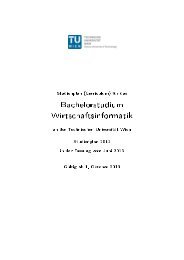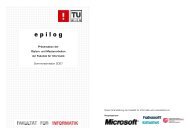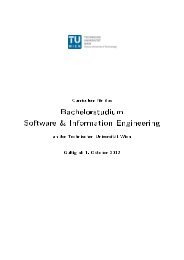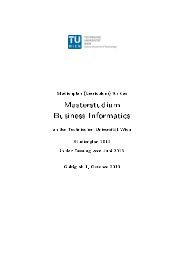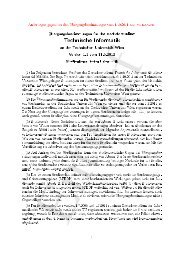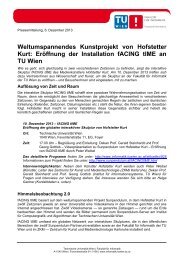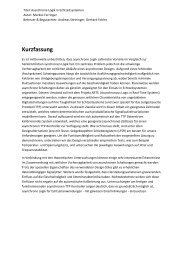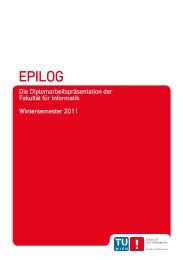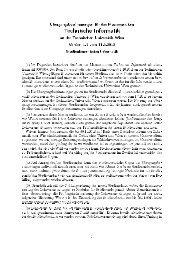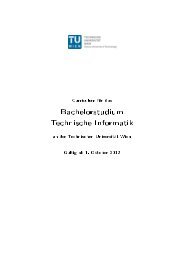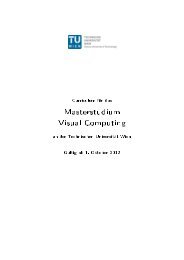Abstract-Band - Fakultät für Informatik, TU Wien - Technische ...
Abstract-Band - Fakultät für Informatik, TU Wien - Technische ...
Abstract-Band - Fakultät für Informatik, TU Wien - Technische ...
Sie wollen auch ein ePaper? Erhöhen Sie die Reichweite Ihrer Titel.
YUMPU macht aus Druck-PDFs automatisch weboptimierte ePaper, die Google liebt.
Plattformen aufgearbeitet. Nach Definitionen <strong>für</strong> die einzelnen Ebenen im E-<br />
Learning werden besonders die Einflussfaktoren bei der Gestaltung von E-<br />
Learning Plattformen erörtert. Des Weiteren werden wichtige Erfolgsfaktoren<br />
<strong>für</strong> die Gestaltung einer E-Learning Plattform aufgezeigt. Danach wird auf jene<br />
Funktionalitäten und deren lerntheoretische Anwendung von Moodle eingegangen,<br />
die in der konzeptionellen Umsetzung <strong>für</strong> die Lehrveransaltung<br />
<strong>Technische</strong> Grundlagen der <strong>Informatik</strong> Einsatz finden. Die konkrete Umsetzung<br />
des Konzepts erfolgt als <strong>TU</strong>WEL-Testkurs, der Einsatz von Bestandteilen obliegt<br />
der Verantwortung der Lehrveranstaltungsleitung.<br />
Gregor Ryba<br />
Authorization as a Service - Evaluating the Platform as a Service Paradigm for<br />
XACML Policy Decision Points<br />
Studium: Masterstudium Software Engineering & Internet Computing<br />
BetreuerIn: Ao.Univ.Prof. Dr. Wolfgang Kastner<br />
The "Internet of Things" vision refers to an Internet that is not completely<br />
dependent on humans creating information. It tries to incorporate the physical<br />
world with its objects. The smart grid is one application of this vision. It<br />
integrates ICT technology into the traditional power grid to cope with the new<br />
requirements that are arising out of its continuing expansion and the incorporation<br />
of new energy sources. Because of interoperability many of these ICT<br />
devices are relying on Web services for transportation of the data generated.<br />
Since most of this data is sensitive, privacy needs to be established. The huge<br />
number of devices that are involved in such a system requires high scalability.<br />
Based on an example scenario arising out of the smart grid, this thesis<br />
introduces an architecture offering authorization as a service. It is based on the<br />
two standards XACML and SAML. It is documented with the 4+1 view model<br />
and a software prototype is implemented. This prototype is then deployed to<br />
the PaaS framework Appscale. Appscale is an open source implementation of<br />
Google's App Engine framework. It enables the execution of applications in a<br />
cloud environment, without the need to take care of the issues arising out of<br />
the distributed computing model. For comparison a version of this architecture<br />
runnable on an on-premises system is developed. Evaluation of the prototype<br />
focuses on its scalability. Load tests are run against the system in various<br />
configurations with all distributed databases offered by Appscale. The<br />
recorded results are ranging from a very unstable behaviour to the awaited<br />
scalability dependent on the number of nodes used for Appscale deployment.<br />
17



